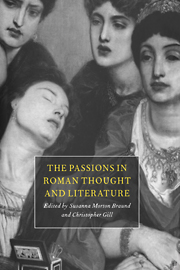Book contents
- Frontmatter
- Contents
- Preface
- Conventions
- Introduction
- 1 Epicurean anger
- 2 Cicero and the expression of grief
- 3 The subjugation of grief in Seneca's Epistles
- 4 A passion unconsoled? Grief and anger in Juvenal Satire 13
- 5 Passion, reason and knowledge in Seneca's tragedies
- 6 Imagination and the arousal of the emotions in Greco-Roman rhetoric
- 7 Pity, fear and the historical audience: Tacitus on the fall of Vitellius
- 8 All in the mind: sickness in Catullus 76
- 9 Ferox uirtus: anger in Virgil's Aeneid
- 10 ‘Envy and fear the begetter of hate’: Statius' Thebaid and the genesis of hatred
- 11 Passion as madness in Roman poetry
- Bibliography
- Index of ancient passages
- General index
10 - ‘Envy and fear the begetter of hate’: Statius' Thebaid and the genesis of hatred
Published online by Cambridge University Press: 18 December 2009
- Frontmatter
- Contents
- Preface
- Conventions
- Introduction
- 1 Epicurean anger
- 2 Cicero and the expression of grief
- 3 The subjugation of grief in Seneca's Epistles
- 4 A passion unconsoled? Grief and anger in Juvenal Satire 13
- 5 Passion, reason and knowledge in Seneca's tragedies
- 6 Imagination and the arousal of the emotions in Greco-Roman rhetoric
- 7 Pity, fear and the historical audience: Tacitus on the fall of Vitellius
- 8 All in the mind: sickness in Catullus 76
- 9 Ferox uirtus: anger in Virgil's Aeneid
- 10 ‘Envy and fear the begetter of hate’: Statius' Thebaid and the genesis of hatred
- 11 Passion as madness in Roman poetry
- Bibliography
- Index of ancient passages
- General index
Summary
hatred. A mental state of revulsion from something that offends us – a dislike or feeling of ill will, intensified by the desire to harm or injure or make a speedy end of the object hated … this applied in chief to hatred of persons by persons, at the root of which lies the desire to destroy.
(W. L. Davidson, Hastings Encyclopaedia of Religion and Ethics)
In discussing the treatment of psychology (or ethics) in Roman creative literature it is not always easy to reconcile the approach of philosophers, whose primary interest is in the reception of Hellenistic ethics and psychology, with that of literary interpreters who start, as I do, from the desire to understand the motivation of a poetic text. Previous work on Senecan tragedy and Lucan has made me sceptical of claims for a primarily ethical and specifically Stoic motivation of their tragedy and epic: instead, their characterisation appears to me rooted in the psychology of the poetic tradition and the ethics of a Roman cultural code that was only partly affected by Stoicism. However, even without positing a Stoic purpose, the student of Lucan and Seneca must recognise that Stoic conceptions of the human mind and human behaviour contributed to the way in which both poets retell both myth and history.
This chapter focuses on Statius' Thebaid, a work written a generation after Seneca and Lucan and clearly reflecting their influence. Statius himself came from a different milieu from that of the Annaei, more Hellenic, and at the same time more concerned with professional technique and the literariness of poetry.
- Type
- Chapter
- Information
- The Passions in Roman Thought and Literature , pp. 185 - 212Publisher: Cambridge University PressPrint publication year: 1997
- 16
- Cited by



